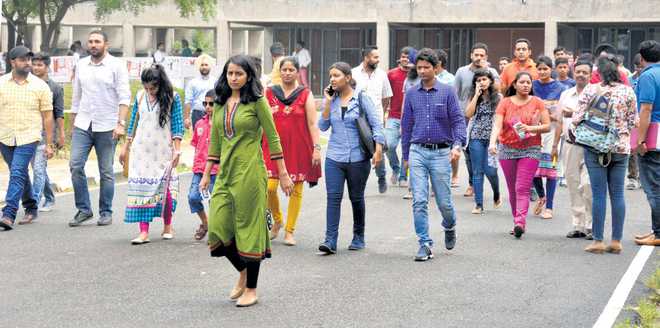Saurabh Gupta
Every year, the Common Law Admission Test (CLAT) takes place in the month of May. It is a time for showdown for the 50,000 odd aspirants taking the exam that has been growing in magnitude year after year. However, for some, CLAT becomes a scary future that they have to inevitably go through. I feel I am addressing the thousands of scared souls through this article, since I myself have been a victim of the same dread.
For many, English is the section that they are most unhappy with. It seems as if no practice can help them conquer these 40 questions, no matter how many hours you put in working at it. For me, English is basically two things: vocabulary and logic. Vocabulary can be enhanced through a religious reading of the newspaper editorials and word lists, etc. As far as logic is concerned, that is where practice comes into play. The more you practice, the more cognitive you get.
Maths is the next evil. Personally, I don’t think maths should be much of a problem for those who opt for the subject after class X, since they haven’t lost touch. For others, I think the major problem lies in their psychology. Just because a few others have maths in class XI and XII and you don’t, it doesn’t mean they would do better.
As long as you don’t convince yourself that you can actually be good at maths, there’s a slim chance that you would be good at it. So, step 1: Believe you can do it. Tackle every question as if it’s something that 14 year olds do, which most of the times it really is. With practice, you’re bound to get faster and more accurate.
Legal aptitude is something that most of us don’t have a major problem with, and this is where the real problem lies. With 50 questions, this is one of the most important sections. However, we presume that just because we get 40 out of 50 correct, more accuracy as compared to other sections in terms of percentage, ‘we know legal’.
However, I would suggest you should rethink your strategy and aim to get at least 45 in this section because it is possible.
Legal reasoning questions should be seen as a fixed set, which can’t change much. So, the key to cracking this section is consistent practice. Once you’ve gone through all question types and topics around thrice, I can bet you won’t get them wrong in the future. Past year papers can verify what I’ve said here and I suggest the aspirants to go through these papers. Legal General Knowledge (GK) again is a game of practice.
Logic comes next. As much as I hate the repeated use of the word practice in this article, I can’t help but use it again for this section. Logic isn’t something you can improve. You already have it in you. It’s just that you can train yourself to answer the specific type of questions asked in this
section, particularly the analytical reasoning part. So practice, practice and practice (Here, I used it again thrice).
For the verbal reasoning part, a good hold on the English language and a fairly large lexicon can help. So, reading the newspaper editorials and general practice can help with this. Aim to achieve what is known as a one-time comprehension: read a question along with the four options just once, and know the answer. It sounds easier than it really is, but if you can do this with even half the questions in this section, it can be a game-changer.
Then the General Knowledge, the playground of quizzers. There’s no doubt being a quizzer helps here, but that doesn’t mean the rest of us can’t do it. What makes it doable for the others is that CLAT focuses on certain specific areas of General Knowledge, and not the vast expanses that it can go to in case of exams like the UPSC.
So, focus on these key areas, be up to date with the current affairs, and you’re good to go. And yes, for current affairs, follow a website, a magazine and whatever material you get from your coaching institute, in case you go to one. This helps diversify your reading, and tends to make it more interesting than it already is.
One thing that I would like to recommend is joining a mock test series without fail. Mock tests help analyse our strengths and weaknesses, and not only help us work harder, but also smarter, because this way, we can devote more time to sections that need more time.
Believe me it varies from person to person. So, take these tests regularly, and work on your weak areas.
Lastly, I think a pep talk from time to time can help a lot. Find a person to do this for you. And find a person to motivate you, rather than asking you to chill at all times.
So, a friend might not work.
CLAT is more about consistency and hard work, rather than intelligence. You won’t find the most intelligent people in Law schools, but certainly those people who put in the maximum hours and manage their time well. Full effort will lead to full results, which almost always won’t come immediately.
That is why consistency is as important as anything. So work hard, be a smart and consistent worker. That’s pretty much it.
(Saurabh Gupta was ranked 30th in CLAT in 2017 and secured the second rank in the All-India Commerce stream Class XII, CBSE)
Unlock Exclusive Insights with The Tribune Premium
Take your experience further with Premium access.
Thought-provoking Opinions, Expert Analysis, In-depth Insights and other Member Only Benefits
Already a Member? Sign In Now











